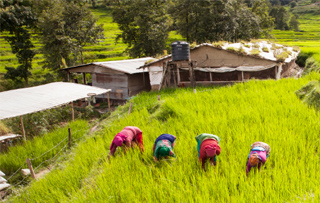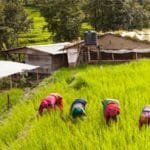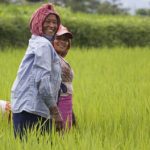
Agroforestry volunteering combines the needs of farmers to a more reliable and sustainable natural resource. The traditional style of farming in Nepal is ‘terrace farming’; where receding flat surfaces are cut into a sloped plain. This labor-intensive practice also threatens to cause soil erosion, water pollution, and a depletion of the flora and fauna, seriously jeopardizing the ecological balance of hilly landscapes. Nepal is a country with almost two third of the population solely dependent on agriculture and 40% Nepal landmass is covered by forest. Most of the farmers live in rural areas and exploitation of forest reserves is a harsh reality. Trees play a vital role in serving as fodder for animal husbandry, providing firewood and more. We therefore combine forest and agriculture ideas to address farmers’ multiple needs and conserve landscape, soil erosions and biodiversity.
The goal of the Agroforestry Project is to ensure sustainable food production and promote biodiversity as well as reduce erosion. Agroforestry is the management and integration of trees, crops and livestock on the same plot of land and is an integral component of productive and sustainable agriculture. The Agroforestry is land-use systems and technologies where trees, shrubs, bamboos etc. are managed effectively. Farmers can harvest multiple benefits and maximize their revenue.
Volunteers in an agroforestry project will have multiple roles. This project focuses on an integrated approach to farming using interactive benefits by combining trees and herbs with crops and livestock. It is crucial to emphasize on agroforestry as a substitute to centering on modern agriculture and forestry individually. Our efforts in marginalized communities confirms wellbeing of small farmers in Nepal by ensuring sustainable food production, forest products harvesting and sustainable socio-economic development. So your role varies from planning agroforestry processes, training farmers and actual hands on work on the farm land.
During your placement you will live with a local Nepali host family within the project site, enabling you to become fully immersed in the language and culture around you. Depending on your skills, the agroforestry volunteer/ intern will carry out one or more of the following activities:
- Conduct a baseline survey in our working communities to learn current farming practices and status of agroforestry.
- Assist farmers in development of sustainable agroforestry systems that produce crops, trees, livestock, fish, herbs etc.
- Promote agroforestry as one of the alternatives for sustainable natural resource management.
- Help farmers renovate their land structure and other infrastructure such as, livestock sheds, fencing.
- Facilitate training sessions on Agro-forestry – land management, animal husbandry and fishery.
- Promote alternative farming trends, such as beekeeping, food conservation, soap making with herbal products or honey.
- Conduct impact analysis by continued monitoring and evaluation of the implemented interventions.
- Teach English to the farmers and their children.
Project Specific Skills
- Education or working background in Agroforestry
- Proficient in conducting workshops and training
- Research skills
- Knowledge on natural resource management
- Passion on working for rural disadvantaged communities
Desirable/ Common Skills
- Excellent communicator with good interpersonal skills
- A team player with good workethics
- Time management and leadership qualities
- Adaptable, flexible and able to work under pressure
- Accepting of different ideas and culture
- Problem solving: always be part of solutions than part of a problem
- Creative
- Positive attitude
Requirements
- Gender: Female / Male
- Minimum Age: 18+ years (16-17 years old person can volunteer but need to present parents’/ guardian’s consent letter)
- Language:English (Intermediate)
- Educational:High School Graduate
Your Experience/ Setting
Upon your arrival at Kathmandu Tribhuvan International Airport (TIA), you will receive a warm welcome and be transported to your hotel or hostel. If you are already in Nepal before the start of your placement, we can make alternative arrangements for you. You will undergo a comprehensive two- to three-day induction program after arrival. This induction will provide valuable information about your project and general information about the Nepalese language, culture, health, safety, and security. It is also an excellent opportunity to connect with fellow volunteers and interns who can become your companions for sightseeing and a source of support throughout your volunteer placement.
During the induction period, you will be accommodated in a budget hotel or hostel arranged by VIN. However, most of the VIN experience involves living with a Nepalese host family. While this immersion is essential for a complete experience, we understand that it can be challenging as you adapt to a new culture and adjust to facilities that may be more basic than you are accustomed to. Don’t worry; all our host families have experience accommodating volunteers, although their English-speaking abilities may vary. Also, you will have 24-hour access to our staff members for support and assistance throughout your placement.
Volunteers will be assigned to one of VIN’s working areas, which include Tarakeshor Municipality in Kathmandu, Taluwa, Thulachhap, and Bhadaure in Okhaldhunga, and Okharpouwa and Kaule in the Nuwakot district. While at the working site, volunteers are requested to bring their lunch box, water bottle, safety gear, face mask, and any other essential belongings. We advise volunteers to dress comfortably and modestly, preferably with long sleeves. Please get in touch with us for guidance and support if you want to raise project funds or collect project-specific resources. This will help the community a lot.
Schedule and Commitment
You will work five to six days a week, up to six hours per day. You may propose your preferred time and hours; however, the working time period will be dependent on the institution you have been placed. A minimum of 2 weeks’ time commitment is expected of a volunteer. The longer you commit; the better impact you can make. You should be willing to commit a certain amount of your free time and energy, show a lot of commitment and be a good listener. You are expected to work constructively and co-operatively maintaining good reputation and standards at all times. Volunteer should abide by relevant security concerns and access procedures. Moreover, you should be receptive and positive to performance appraisal, advice and feedback. Throughout your placement, you will have the full support of VIN. Your safety is our highest priority.
Your typical day might look like this:
| 07:00-08:00 | Tea/Leisure Time |
| 08:00-09:00 | Breakfast/Brunch (Nepali meal – Daal-Bhaat) |
| 09:00-10:00 | Preparation for sessions |
| 10:00-13:00 | Conduct Research |
| 13:00-14:00 | Lunch (Packed lunch) |
| 15:00-17:00 | Deliver sessions for people on a cluster basis |
| 17:00-20:00 | Preparation for next day/Leisure time |
| 20:00-21:00 | Dinner (Nepali meal – Daal-Bhaat) |
You will receive a clear and concise on-the-job instructions, course of action, context of work and policies/strategies before your placement begins. You will be provided with ample of guidance and support throughout the placement with trainings / onboarding sessions incase necessary. You will be in a constant communication and regular check-in with the VIN volunteer coordinator. VIN aims to maintain a culture of continuous feedback between the volunteer supervisor at the placement to monitor the performance of the volunteer and ensure the project delivers desired outcomes.
In case of an emergency, you may contact one of our Volunteer Coordinators who will be available anytime for your assistance and support.
Click here to Learn more on how volunteering works
Mid and Long Term Volunteers:
2 weeks minimum stay- € 380
3 weeks – 480€
4 weeks – 580€ (after 4th week, for each additional week €95)
University Internships:
4 weeks minimum stay- € 680 (for each additional week – €105
Click here to Learn what’s included and excluded in our Fees Section
Click here to Learn recruitment process on how volunteering works
Our projects are open year-round, and our inductions begin on the first and third Mondays of each month. We would like to ask that volunteers arrive one day before the start of the induction. You can choose the duration of your participation based on your available time. However, so that you know, our volunteering placements are limited. We highly recommend booking your placement in advance to secure your placement. Click here to apply.



 Member of
Member of